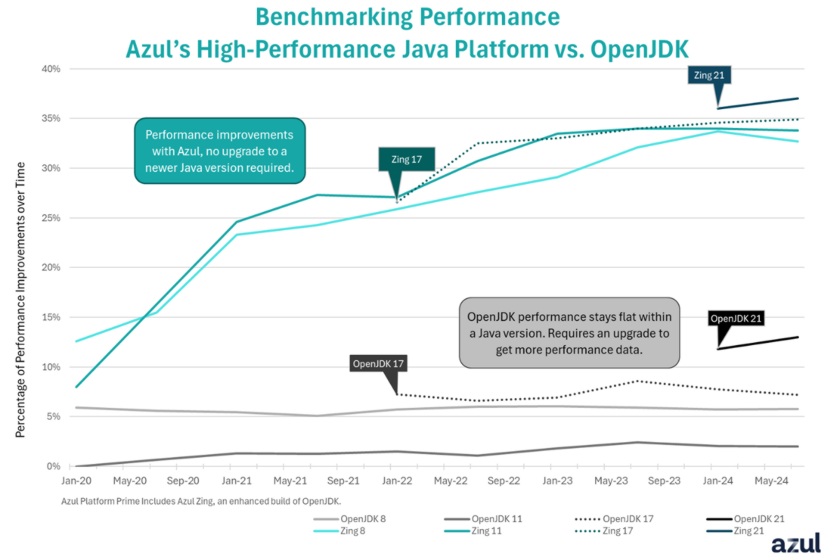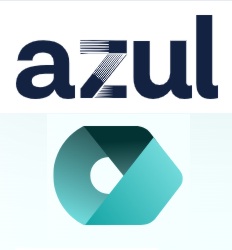| Azul Outperforms OpenJDK By Up To 37% |
| Written by Sue Gee | |||
| Wednesday, 23 October 2024 | |||
|
Azul has announced that its Azul Platform Prime outperforms comparable OpenJDK distributions by as much as 37%. The company has also launched the Azul Java Performance Engineering Lab (JPEL) aimed at helping customers get the most from Azul Platform Prime.
We have reported previously on Azul's various initiatives to enhance Java performance and make its JVMs faster and more cost effective than the OpenJDK. Its managed cloud platform Azul Prime Platform includes its proprietary Zing JVM, designed to provide immediate performance gains versus other OpenJDK distributions with no code changes or recompilation required. Prime can also be used to eliminate cloud compute waste by reducing pod counts for workloads (and therefore cloud infrastructure costs). Now Azul has used the Renaissance Benchmark Suite to compare Zing with comparable versions of the OpenJDK: The period covered starts in January 2020 at which time Zing 8 and Zing 11 outperformed their OpenJDK equivalents by around 7%. The gap between Zing 17 and OpenJDK 17 when they appeared in January 2022 was about 20% and that between Zing 21 and OpenJDK 21 in January 2024 was about 25%. However the main purpose of the graph is to show how, while earlier versions of the OpenJDK hardly improved their performance over time and that the only way to get better performance was to upgrade, all versions of Zing showed improved performance. The 37% difference is between Zing 21 and OpenJDK 11. The difference between Zing 21 and OpenJDK 21 is 25%, which is still pretty impressive. Zing's superior performance in handling transactions and business logic at the runtime layer can be attributed to its use of a fast compiler, the Falcon JIT, its C4 pause-less garbage collector and ReadyNow Warm-up acceleration for newly added instances. To make Azul Platform Prime even more attractive, the Java Performance Engineering Lab has been launched. The lab works with architects, developers, and site reliability and performance engineering teams to introduce optimizations that improve Java speed and performance. Azul’s performance engineers also make recommendations on how to modernize their own application code which can result in even further performance gains. Azul’s engineers continually test the code speed of Azul Platform Prime compared to other OpenJDK distributions using accepted industry standard benchmarks such as Renaissance, DaCapo and SpecJBB, as well as benchmarks for popular Java-based Apache projects like Kafka, Cassandra and Solr. Each LTS release, and updated versions of those LTS releases, typically impact Java performance. Azul continuously assesses the performance of a wide range of Java releases to improve performance and operational efficiency. Azul’s Java Performance Engineering Lab also evaluates emerging technologies including:
Scott Sellers, co-founder and CEO at Azul commented: “In today’s cloud-driven economy, where every millisecond and dollar counts, Azul Platform Prime is the clear choice for organizations looking to enhance user experiences, reduce operational costs and drive competitive advantage.” More InformationRelated ArticlesAzul's Cloud Native Compiler - Why Share The JIT Compiler? Azul Reports On Java Migration Azul To Tackle Java's Warm Up Issues Azul Zulu OpenJDK 17 Build Now Comes With CRaC
To be informed about new articles on I Programmer, sign up for our weekly newsletter, subscribe to the RSS feed and follow us on Twitter, Facebook or Linkedin.
Comments
or email your comment to: comments@i-programmer.info |
|||
| Last Updated ( Wednesday, 23 October 2024 ) |




